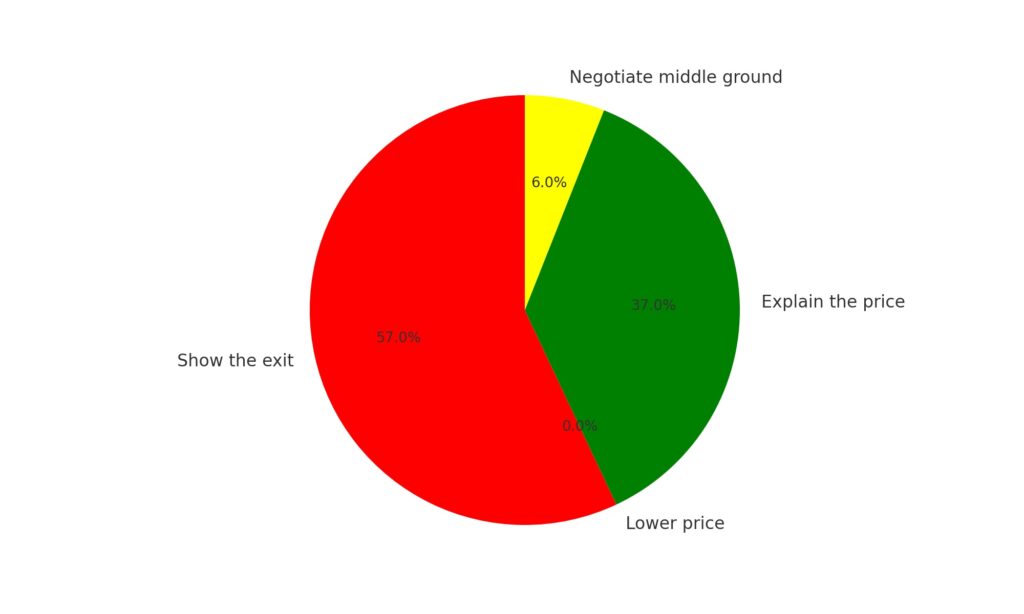As the owner of a collision repair shop, you’ve likely encountered a situation where a customer, right after receiving your estimate, asks for a lower price. Often, they’ll mention competitors who allegedly offered a better deal. Whether that low price is genuine or not is another matter entirely. But for the sake of this discussion, let’s assume it’s true. So, how should you respond? Regardless of whether you run a body shop, general repair workshop, or detailing studio, knowing how to handle price negotiations is crucial.
Our marketing department recently conducted a survey on this very topic. Respondents were asked how they would respond to a customer requesting a lower price. The responses were as follows:
- A. “I’d show them the exit.” – 57%
- B. “I’d lower my price to win the business.” – 0%
- C. “I’d explain why my price is justified.” – 37%
- D. “I’d negotiate to find a middle ground.” – 6%

While these results weren’t entirely surprising, the fact that more than half of businesses would turn away potential customers is alarming. Here’s why.
Being a Good Technician Isn’t Enough
As an entrepreneur, you wear many hats. You need to provide excellent service, manage inventory, handle accounting, market your business, and—crucially—sell. Sales are an essential part of any business. Without sales, there are no customers, no revenue, and no business. However, many business owners aren’t formally taught how to sell. We learn technical skills, such as how to handle a spray gun, match colors, or prep a vehicle, but sales? Not so much.
The notion that high-quality work will automatically bring in hordes of customers is misleading. While good word of mouth is helpful, it’s not enough to sustain a business. Marketing brings potential customers in, but it’s your sales skills that will make them stay.
Turning Away Customers: A Missed Opportunity
I anticipated that some body shop owners would refuse to negotiate, but I didn’t expect nearly 60% would choose to turn customers away just for asking for a better deal. That’s a luxury few can afford in today’s competitive market.

The Pitfalls of Price Wars
The survey showed that none of the participants are willing to engage in a price war—a very positive sign. Competing solely on price is a losing strategy. In the long run, slashing prices to beat competitors erodes profitability and can harm your reputation.
Defending Your Price: The Winning Strategy
Personally, I believe the best approach is to explain why your price is set where it is. This is a win-win strategy, and here’s why: If you immediately show the customer the door, they’ll walk away labeling your shop as “expensive.” That’s not the label you want for word-of-mouth referrals.
Instead, take a few moments to explain the value behind your pricing. For example, tell them that you use the highest quality materials, apply an anticorrosive primer where needed to protect the vehicle, and that you don’t skip any steps in the preparation process. Ensure them that their vehicle will leave your shop in pre-accident condition, with perfect color matching. Show them examples of poor-quality work: rusted vehicles, peeling paint, or mismatched panels. Guarantee that such issues won’t happen with their vehicle.
Spending an extra five to seven minutes explaining this can change the customer’s perception. Even if they walk away, they’ll leave thinking, “That shop is expensive, but worth it,” rather than just “expensive.”

Finding a Middle Ground: When It Makes Sense
While lowering your price isn’t generally advisable, there are situations where a small discount might be appropriate. For instance, if you’re dealing with someone in need, such as a single mother or an elderly person, offering a slight reduction can be an act of goodwill. Consider it your contribution to the community. Acts of kindness can pay off in the long run by building loyalty and positive word of mouth.
Key Takeaway
Being a skilled technician is only part of the equation. To run a successful business, you must also be skilled in customer communication and sales. Learning how to effectively communicate your pricing and the value behind it is crucial. It’s a skill that can be learned, and it’s one worth investing in.
Ultimately, how you handle price discussions will influence not just your immediate business, but your long-term reputation as well.




